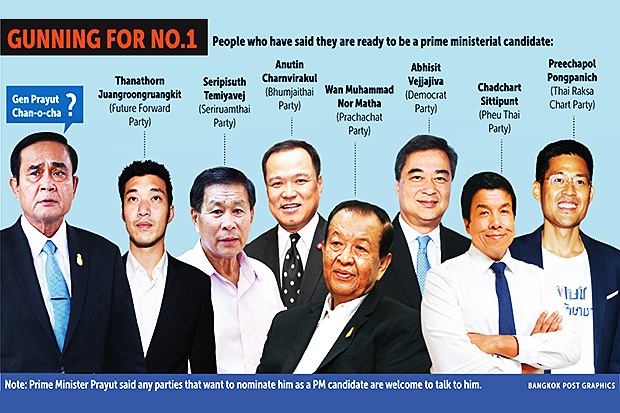
With a date yet to be fixed for the coming general election, Prime Minister Prayut Chan-o-cha said Tuesday he would consider joining any party that does not abandon the policies set in motion by the current government.
"But a political party must invite me [to join] first. Whether I would accept the invitation is another story," he said.
"If I decide to stay on [in politics] to carry on the work, I will need to subscribe to a party which is dedicated, truly selfless and determined to change the country for the better, not one which seeks to undo everything this government has started. That would be a waste of time," the prime minister said.
Gen Prayut said he would have to decide if he wanted to remain in politics and if so, how and what he must do to realise his future undertakings.
He added he has not been approached by the pro-regime Palang Pracharath Party (PPRP) to join it.
The PPRP has made it known Gen Prayut is among its first choice of prime ministerial candidates to be nominated for a vote in parliament after the poll.
The premier said the government has achieved much during its four years in power, and that these have all been compiled in a book that has yet to be released.
Many priority policies on the national agenda have been addressed and more, including those requiring legal amendments, are being straightened out to remove obstacles with implementations, he said.
Future governments are free to improve on these policies and laws where needed but they should not abolish them, Gen Prayut said. The laws include those on budget expenditure and anti-corruption measures related to rice schemes.
Gen Prayut said he has received over 200 complaints about how some parties are preparing for the poll and that they will all be looked into.
Turning his attention to the controversial Sor Por Kor land ownership papers, which some PPRP members suggested should be made available as collateral for loans, Gen Prayut said the issue was being discussed.
Voicing caution, he said this could lead to abuse of the principle of the Sor Por Kor land reform programme, which offers land to landless farmers for agricultural purposes only.
If the programme is not handled carefully, the land could end up in the wrong hands and be commercialised, he warned.
Speaking Tuesday after the cabinet meeting, Gen Prayut talked politics, and talked tough.
He first warned political parties to ensure promises made during their election campaigns do not break the laws governing state expenditure - meaning laws on finance and budget spending.
But then he opened up with strong political speech and warnings.
Political parties should not keep criticising what the government has been doing while making election promises they cannot keep, he said.
"The two laws need to be looked at carefully as the parties must design their campaign policies within the restrictions imposed by the two acts," he said.
In the case of the government's flagship Eastern Economic Corridor (EEC) scheme, for instance, Gen Prayut said political parties should not try to woo voters who are against the regime by pledging to scrap the project.
The government has already invested more than 900 billion baht in the scheme and it would make no sense to terminate it, Gen Prayut stressed.
The prime minister said the government has laid the foundations of a "new house" by rolling out policies since it took power four years ago, which should be carried on by the next administration.
He hit back at politicians who decried what the government has done, saying some of them had served in past governments which created the problems.
"Why did they not succeed when they were under previous governments?" he asked.
The Election Commission (EC) effectively joined in, issuing a statement claiming to outline what it believes parties are allowed and prohibited.
Signed by EC secretary-general Jarungvith Phumma, the statement was released in response to inquiries by parties.
Campaign manifestos must be formulated with the involvement of party branches as well as provincial representatives, according to the statement.
Under Section 57 of the organic law on political parties, campaign policies which require financing must contain essential details, and an estimate of the budget. Benefits to be gained, potential impacts and risks must also be clearly stated.
The candidates must not furnish their own campaign with promises that contradict their party's manifesto, as stipulated by Section 74 of the organic law, said the EC statement.
Parties can air their policies through various channels and do not need to submit advertisements to the EC for prior inspection, said the statement.
